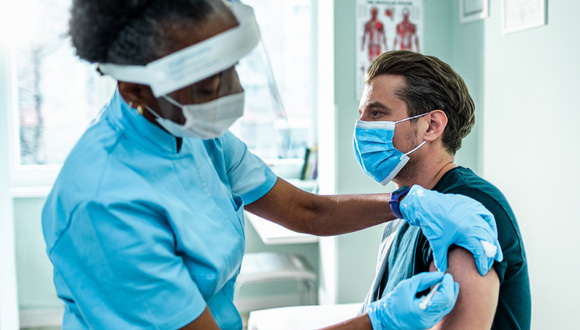Talk of a second COVID-19 booster shot is in the air, but you're not alone if you're unsure about what any of it exactly means for you.
"The FDA recently authorized a second booster dose of either the Pfizer-BioNTech or the Moderna COVID-19 vaccine for older adults and certain immunocompromised individuals," says Dr. Ashley Drews, medical director of infection prevention and control at Houston Methodist.
But, even with this authorization, you likely still have some questions.
Dr. Drews is here to explain everything you need to know about second booster shots right now.
Can I get a second booster shot?
You are eligible for a second booster shot of Pfizer or Moderna if:
- It's been at least 4 months since your first booster dose* and
- You are 50+ or
- You are immunocomprised (and at least 12 years old**)
*If you are immunocompromised, your third shot was your additional primary dose and your fourth shot was your first booster dose
**Your second booster dose must be Pfizer if you are between the ages of 12 to 17 since the Moderna vaccine is only approved for people who are 18+
If you don't meet these criteria, you may still be able to get a second Pfizer or Moderna booster shot via a doctor-prescribed dose.
Because both vaccines are fully approved by the FDA, your doctor can choose to prescribe another dose of either the Pfizer or Moderna vaccine as a second booster, based on his or her best judgment for off-label prescribing.
Still, just because you can get another dose, does that mean you should get one right now?
Should I get a second COVID-19 booster right now?
According to Dr. Drews, the answer primarily depends on your age and any medical conditions you have.
"I wouldn't wait to get your second booster if you have a high personal risk of getting seriously ill if you catch COVID-19," says Dr. Drews.
For those who are most vulnerable, this applies even if COVID-19 cases aren't high in the area.
High risk groups include people who are:
- 65+
- Seriously immunocompromised
- 50+ and have underlying health conditions, like diabetes
On the flip side, however, Dr. Drews says that not every person eligible should feel like they need to rush to get a second booster.
"In the absence of other serious medical conditions, we're not convinced that boosters currently offer significant benefit to those under the age of 60," Dr. Drews adds.
For instance, if you're 55 and have no medical conditions, there's likely no harm in waiting to get your next booster until the benefit to healthy adults becomes more clear — although Dr. Drews adds that there's likely no harm in getting another dose right now, either.
Lastly, if you had COVID-19 very recently, you can also safely wait to get another booster.
"If you had the first booster and a confirmed omicron infection with a PCR test, we do not think you need a second booster at this time," says Dr. Drews.
Is it worth it to wait on an omicron-specific booster?
Not likely.
"If you're high risk, don't wait," says Dr. Drews. "It's not yet clear whether omicron-specific boosters are advantageous. Additionally, by the time such a booster is available, omicron may have been superseded by another variant."
In other words, there are too many unknowns to base plans and actions on potential omicron-specific boosters — especially for those who are high risk.
Should travel be factored into your second booster decision-making?
For those eligible but under 60 and without pre-existing health conditions, upcoming travel could be a reason to get your second booster sooner rather than later — especially if you're traveling to an area with higher caseloads.
"Keep in mind, however, that you should plan ahead to get your booster shot at least two weeks prior to your travel so you can reap the full benefit," adds Drews.
Should you switch to a different vaccine for your second booster?
Should I switch to Moderna? Should I switch to Pfizer?
We've all likely wondered one or the other.
Both vaccines are incredibly effective, but does mixing-and-matching truly provide stronger protection?
"It has now been shown to be safe to switch from one mRNA vaccine to the other, such as from Pfizer to Moderna or vice versa, and studies suggest potential increased immune response when doing so," Dr. Drews adds.
Will a second COVID-19 booster shot be needed for everyone eventually?
A second booster dose may eventually be needed for everyone for the same reason a first booster shot was recommended last fall and winter: to prolong protective immunity when there's concern it may be waning.
There's no immediate concern of this in young, healthy people right now, though — many of whom likely also had confirmed omicron infections recently.
Still, as we've seen time and time again during this pandemic, the situation could change.
The BA.2 "stealth" omicron variant is predicted to cause an uptick in COVID-19 cases, but it's not expected to cause another full-blown surge like we saw this winter with the BA.1 variant.
However, a new variant capable of causing another surge could arise in the future — challenging protective immunity more generally and warranting a second booster for everyone.








